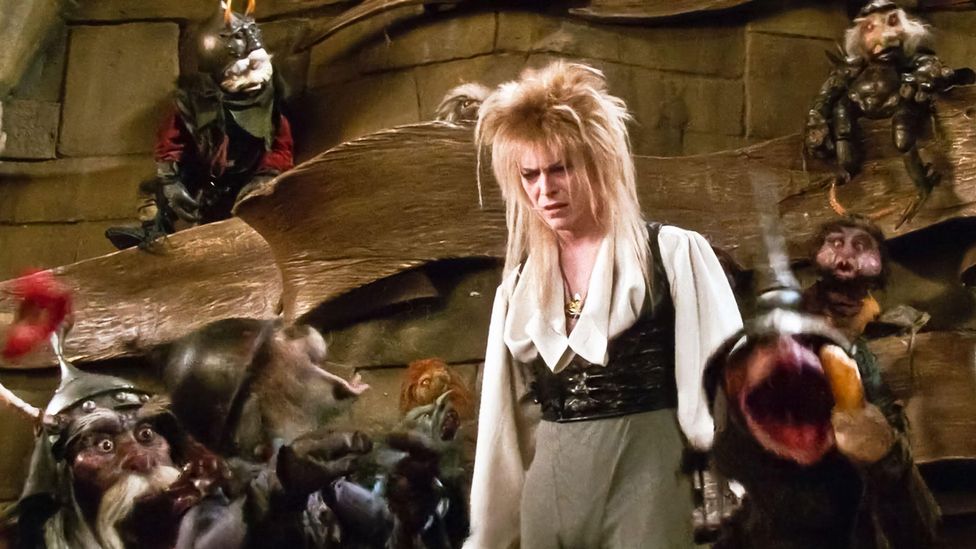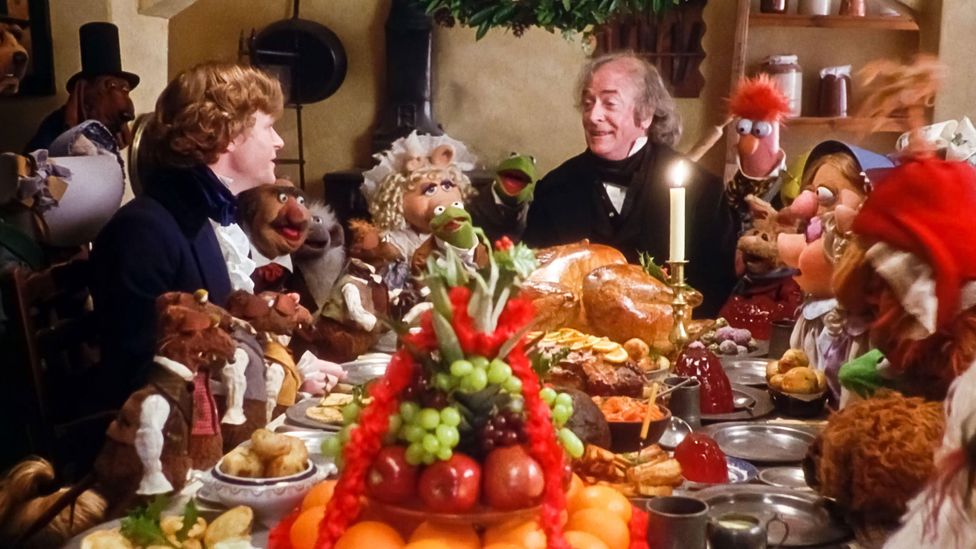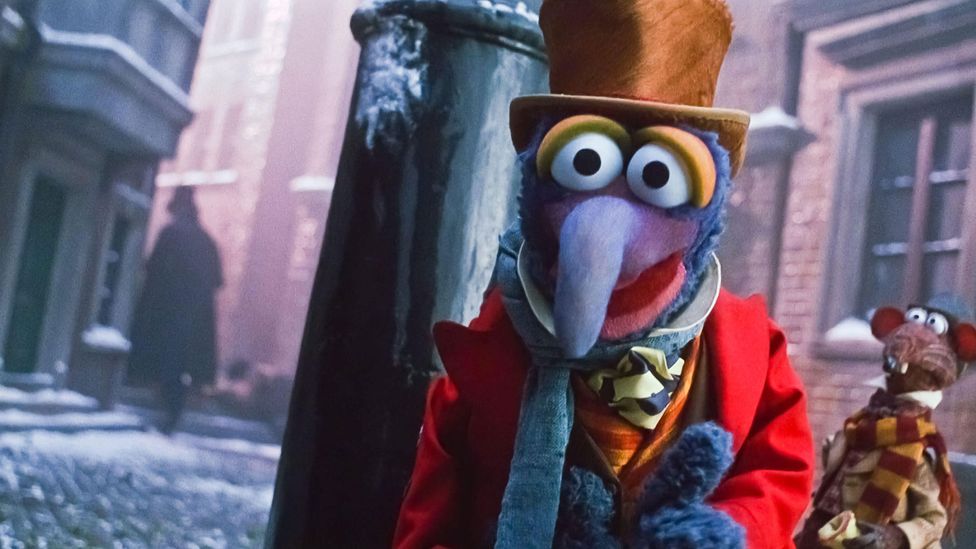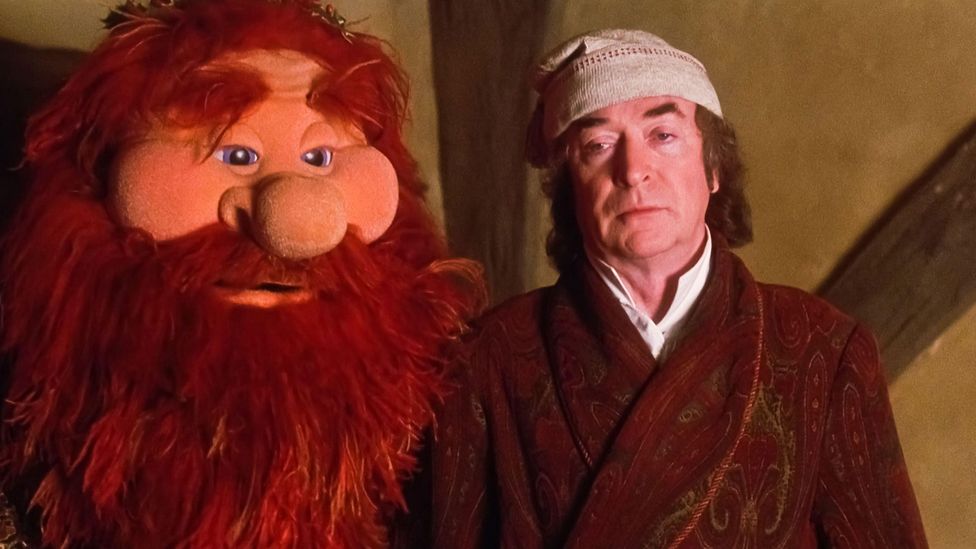The dark backdrop to a festive classic

When Brian Henson was hired to direct The Muppet Christmas Carol, he was terrified.
“I didn’t want to do it,” Henson admits to BBC Culture. He had good reason, too. Not only was this his feature film debut as a director, but he was stepping into the shoes of his father Jim Henson, the puppeteer and filmmaker who had created the Muppets and turned them into pop culture icons, before tragically dying at the age of 53 in May 1990.
“We’d lost Jim. We were all really still mourning,” says Steve Whitmire, who, like Brian, was tasked with replacing Jim Henson in The Muppet Christmas Carol, this time by voicing and puppeteering Kermit the Frog. “We were also just trying to move forward. We were not completely sure whether we would. That’s one of the most interesting things about the film on the inside, it was really a bit of a test. Could we continue without Jim?”
More like this:
– The X-rated cartoon that shocked the US
– ‘A delightful, fresh new romcom’
– ‘A spectacular, action-filled epic’
Henson believed that Frank Oz, the voice of Miss Piggy, Fozzie Bear and Animal, as well as the director of The Dark Crystal, Little Shop of Horrors and Dirty Rotten Scoundrels, should have been overseeing The Muppet Christmas Carol instead of him.
“But Frank was the biggest strong supporter of me doing it,” says Henson. “He told me, ‘I’ll be on set with you the whole time.’ He was. Frank was on set every day. He was wonderful support. But, yeah, I was terrified.”

Brian Henson had worked on darker films like Labyrinth before he directed The Muppet Christmas Carol (Credit: Alamy)
It turns out that Henson was actually the perfect filmmaker to make The Muppet Christmas Carol. Not just because he was the son of their creator. He’d also previously worked as a puppeteer and performer on a variety of darker movies using animatronics and puppets, including Labyrinth, Teenage Mutant Ninja Turtles and The Witches.
“I was able to bring that darkness that I had been working in, and mix it with the comedy. That’s the whole film,” explains Henson. “It’s Dickens and Henson. Scrooge is the leader of Dickens. Kermit the Frog as Bob Cratchit is the leader of Henson. The two contrasts crash into each other. They’re not particularly comfortable cohabitants. That’s why it’s so exciting.”
Audiences were similarly excited by the film. The Muppet Christmas Carol was a minor success upon its release on 11 December, 1992, grossing $27.2 million from a $12 million budget. It also received mostly positive reviews, with Paul Williams’s delightfully catchy songs earning special praise.
The writer of The Carpenters’ We’ve Only Just Begun and Barbra Streisand’s Evergreen, Williams had worked on The Muppet Show and The Muppet Movie, earning an Oscar nomination for the latter’s song Rainbow Connection. Which is all the more remarkable, since Williams struggled with alcohol and drug addiction through his life, up until 15 March, 1990.
“That’s my sober birthday,” admits Williams. “I’m 32 years sober. By the end of the 80s my career had basically gone. I had misplaced the 80s. When you misplace an entire decade, you have earned your seat and you are officially an alcoholic. I had a reputation in Hollywood as an alcoholic and an addict.”
A story of redemption
Hiring Williams to work on the songs for The Muppet Christmas Carol proved to be a masterstroke, as he used his own recent spiritual awakening as a parallel for Scrooge’s journey.
“All of a sudden I was waking up in the morning with no cravings. I’d found my tribe. I was comfortable and grateful in this world in a way I’d never experienced before,” declares Williams. “That’s when I was asked to write a score about Scrooge, who is experiencing a spiritual awakening and a changed outlook. It was a perfect fit.”
Which makes it all the more surprising, then, that the initial idea for The Muppets to do their own version of A Christmas Carol wasn’t a calculated masterstroke from Henson or anyone at Jim Henson Productions. Instead, in the middle of 1991, just a year after Jim’s death, it was suggested to Brian by his agent Bill Haber, who worked for Creative Agents Agency.
“He has always been a big fan of literary classics,” says Henson. “We knew we needed to do something pretty substantial with the Muppets to propel them forward so that they could live on past my dad. So Bill Haber called me and said, ‘A Christmas Carol with the Muppets. Wouldn’t that be fantastic?'”

The film blends A Christmas Carol and The Muppets in a way that’s respectful to Dickens (Credit: Alamy)
At first, Henson was dubious. The Dickens novel had already been adapted so many times. But Haber insisted that the Muppets would be able to put their own spin on it. He was persistent. For a reason. Henson recalls, “Suddenly he told me, ‘Well, I’ve already sold it to ABC as a special. Give them a call. They’re super excited.'”
So, Henson asked for assistance on the project from screenwriter Jerry Juhl, who had been the head writer on The Muppet Show, and had written The Muppet Movie and The Great Muppet Caper. They briefly flirted with making the special a satire, only to quickly realise that the novel was “too good a story” to make fun of.
“We knew that, if we were going to do it, we just had to do it respectfully, because the story and the book demanded that,” says Henson. “That was good, because it stopped us talking about Miss Piggy as the Ghost of Christmas Present and Gonzo as the Ghost of Christmas Yet to Come. We threw all that out.”
An ardent fan of Gonzo, Juhl decided the Muppet should play Charles Dickens in the film, and he made him the onscreen narrator.

Gonzo is Dickens, and quotes directly from the novel in his narration (Credit: Alamy)
“Jerry wanted Gonzo’s Dickens to be a character out of time and space. That’s exactly what Gonzo is,” notes Henson, who adds that, by taking this approach, Juhl was able to take Dickens’ “remarkable prose” straight out of the book and have Gonzo use them to “set up scenes.”
The direct use of Dickens’ writing from the 1843 novella, and the way it’s mixed with the Muppets, is exactly what make The Muppet Christmas Carol so “magic,” says Robert L Patten, one of the world’s most eminent scholars of Charles Dickens and a former English Literature professor at Rice University.
“The film really makes an effort to use Dickens’ language,” he explains. “It’s very rare that that much of Dickens is quoted. That’s the magic of the film. It brings the Muppets into conversation with Dickens.”
Disney clearly thought the same, too. The studio was so impressed by Juhl’s first draft that they decided to turn the ABC TV special into a theatrical movie. Now armed with a much bigger budget, Henson was able to land Michael Caine to play Ebenezer Scrooge.

Michael Caine lends gravitas to the film (Credit: Alamy)
“Michael was the first actor we approached,” says Henson. “I knew I wanted a British actor, and he had to have a certain standing. That limited the field in a healthy way.”
Whitmire remembers that Caine knew exactly how to approach his role opposite the Muppets, too. “He just said he wasn’t going to ever try to be funny in the film. He played it as though he was onstage in a Royal Shakespeare production. If an actor tries to compete with the silliness and upstage the Muppets, it doesn’t work. Michael gave the characters a real nemesis in the film.”
There was one awkward moment between Caine and a member of The Muppet Christmas Carol’s creative team, though. Unfortunately, when he introduced himself, Williams’ decade-long amnesia made him forget that he’d actually already met the legendary actor.
“I walked into the recording studio and went straight up to Caine and said, ‘It’s so wonderful to meet you’,” recalls Williams. “He turned to me and said, ‘You know, we spent a whole weekend together.’ I just went, ‘Oh my God! You’re right.'”
Soundtrack to a festive hit
That didn’t stop the pair from having a fruitful creative relationship, though. “I was in the studio directing him. Which is me just making faces, singing along with him and doing gestures,” exclaims Williams. “But he was so completely present. He doesn’t just perform the song. He experiences the song. That’s everything you could want.”
One of Williams’s most cherished memories of this process was the song When Love Is Gone, sung by Meredith Braun. “I felt like my greatest success as a songwriter for The Muppet Christmas Carol was When Love Is Gone. Because, emotionally, you see what grief and loss did to Scrooge and his behaviour.”
Unfortunately, when Disney saw the finished film, they asked for When Love Is Gone to be cut out. “Evidently the head of the studio thought it was too sad for kids. Or too boring,” remarks Williams. “I’m not going to try to pretend that I understand what he was thinking.”
The video master of the cut scene was then believed to have been lost for more than 25 years, too, meaning that it wasn’t included in the DVDs or streaming versions. That was until December 2020, when the footage was found again, and it has now been included in The Muppet Christmas Carol’s recent UK re-release to mark its anniversary.
It only feels right that the United Kingdom gets to see The Muppet Christmas Carol in its correct form, as Henson credits the British audience with building its legacy. “The following year after its release, when it was sold on videotape, so many people watched it in the UK. It broke all sorts of records. It was a small-screen hit,” remarks Henson. “It was the British that really forced the reintroduction of the film to the American market. Now, every year audiences just gets bigger and bigger, too.”
The Muppet Christmas Carol’s popularity is so immense that it has become a focal point of the festive season for many friends and families, who insist that Christmas hasn’t really begun until they’ve belted out, “There goes Mr Humbug, There goes Mr Grim,” in unison at full volume.
“A lot of fans talk about it being their favourite holiday film. They watch it with their families every year,” says Whitmire, who insists that its legacy is more important than one film, though. “We were all very motivated on Muppet Christmas Carol. We wanted it to work. Everything came together and it introduced a new generation to the Muppets. It started a new chapter for us.”
Love film and TV? Join BBC Culture Film and TV Club on Facebook, a community for cinephiles all over the world.
If you would like to comment on this story or anything else you have seen on BBC Culture, head over to our Facebook page or message us on Twitter.
And if you liked this story, sign up for the weekly bbc.com features newsletter, called The Essential List. A handpicked selection of stories from BBC Future, Culture, Worklife and Travel, delivered to your inbox every Friday.








